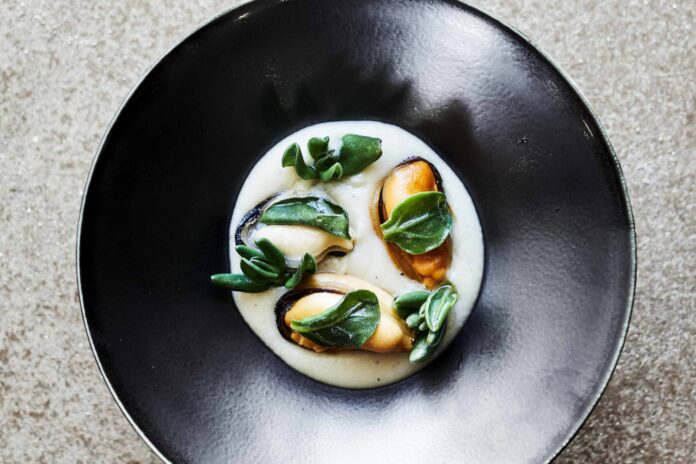servings
For the beans
- 375 g dried heerenbone*
- 100 g salted farm butter
- 50 ml olive oil
- Juice of ½ lemon
- Large pinch sea salt
For the mussels
- 30 mussels Mytilus galloprovincialis, beards removed
- Splash of olive oil
- 100 ml white wine
To serve
- A handful of fresh dune spinach leaves**
- Splash of olive oil
- Squeeze of fresh lemon juice
To make the beans
- Boil the heerenbone in unsalted water for about 40 minutes until completely tender, then drain.
- Purée the cooked beans with the butter, olive oil, lemon juice and salt in a food processor until completely smooth.
To make the mussels
- In a large pot, heat a splash of olive oil to smoking point. Add the mussels all at once and cover with a lid.
- Cook for 1 minute, then lift the lid and stir to evenly distribute heat.
- Add the white wine, cover and cook for a further 2 minutes until all the shells have opened. Strain, retaining the mussel stock.
- Remove the cooked mussels from their shells and double-check that all beards are removed.
To serve
- Heat the mussels in a little of their own stock. Add the remaining stock to the heerenbone purée and heat through.
- Flash fry the dune spinach leaves in a bit of olive oil and a squeeze of fresh lemon juice.
- Scoop the purée into heated bowls, top with mussels and dune spinach leaves, and serve immediately.
* Heerenbone (English translation: “The Lord’s bean”): A South African heirloom bean cultivated in the Sandveld region of the West Coast of South Africa. Substitute with butter beans or lima beans.
** Dune spinach: Native to the dunes of South Africa. Substitute with baby spinach or New Zealand spinach.
